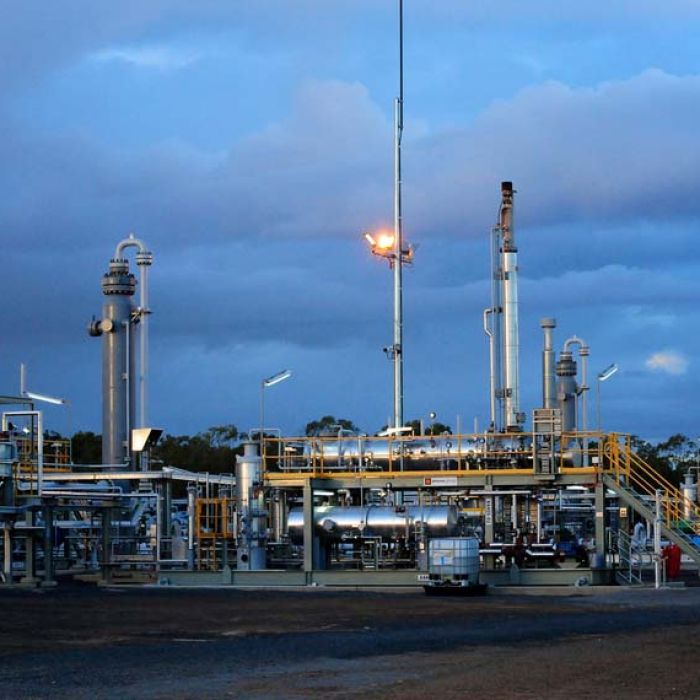
Vote Compass: Australians oppose any relaxation of CSG restrictions
Updated
A growing number of Australians are against any easing of restrictions on the coal seam gas (CSG) industry, Vote Compass data reveals.
Two-thirds of voters say they oppose easing restrictions on CSG exploration, compared to just over half when the same question was asked during the 2013 federal election.
These findings come from more than 250,000 responses to Vote Compass since the election campaign began on May 8.
The CSG industry is politically charged in the eastern states, with some farmers joining environmentalists to protest against exploration and extraction on farming lands in recent years.
The state governments have taken differing action in response to community concern:
- The New South Wales Government has bought back a large number of exploration licences since 2014, with only one major CSG drilling proposal remaining in the state’s north-west;
- Victoria has a standing moratorium on CSG exploration, which is under review and an announcement from the Government is expected next week;
- Queensland has a large number of CSG wells producing gas.
Daniel Robins from CSG protest organisation Lock the Gate said the results clearly showed widespread and growing opposition to coal seam gas across the country.
“This issue breaches the divide of left and right, and people in the cities and in the country areas are saying they oppose this,” Mr Robins said.
“Those concerns will continue to grow as protections to water and protections to people’s health have failed.”
The CSG industry does not agree that CSG exploration and extraction is unsafe.
“Properly regulated this is a safe industry,” said Malcolm Roberts, chief executive of Australian Petroleum Productions and Exploration Association.
“It has tremendous economic benefits for regional communities, it’s producing a product that we need.”
Data ‘speaks to views on regulation’
Dr Roberts said the question asked in Vote Compass spoke more to people’s belief in regulation, rather than any opposition to CSG.
“People are instinctively wary of reducing regulations,” he said. “If the same question was asked about the banking, aviation or aged care industries it would deliver a similar response.”
He said ongoing CSIRO research into community attitudes in regional Queensland had shown a majority of people in areas where the industry operated were supportive.
The Vote Compass results do not deal directly with support for the industry, just with the level of regulation, with 70 per cent of regional Queenslanders opposing an easing of restrictions on CSG.
CSG and farming co-exist
The industry has had positive and negative impacts on grain farmers Ross and Jane Walker, who have 10 CSG wells operating on their Darling Downs property in southern Queensland.
The Walkers spent more than two years in tough negotiations over the location of the wells, which had the potential to get in the way of cropping, and fighting for fair compensation.
“You’re a small dot dealing with a big company that gets what they want; it can be difficult at times,” Ross Walker said.
Jane Walker said their case showed farming and CSG could co-exist but she still believes landholders should have the right to refuse mining on their properties.
“We negotiated a financial deal that was a win-win for both parties,” she said.
“We’re fortunate because we have access from the back of our property, so they don’t come through our front gate or past our house.
“I can be doing the dishes and look up and see a ute driving from a well but that’s about the only time you sort of feel like it’s intrusive — but it’s not that intrusive.”
The Vote Compass findings are based on 252,309 respondents who participated in Vote Compass from May 8 to May 31, 2016. The data has been weighted to ensure the sample reflects the Australian population. [Read the Vote Compass data FAQ]
Election 2016 in charts
-
Turnbull leads Shorten on question of who voters trust
Malcolm Turnbull and Bill Shorten both say the election is about answering the question “who do you trust?”, and Vote Compass data suggests Mr Turnbull has the advantage over his opponent.
-
Vote Compass: Australians support return to carbon pricing
Former Liberal leader John Hewson has cast doubt on the political truism that Tony Abbott’s campaign to “axe” the carbon tax won him the last election, as new figures show a significant majority of Australians now support putting a price on carbon emissions.
-
Australians want a federal corruption watchdog, even though major parties don’t
A large majority of Australians want a federal corruption watchdog similar to the NSW ICAC, though the Coalition and Labor are opposed to it.
-
10 things Vote Compass reveals about Australians’ views on asylum seekers
Where does the public stand on the questions of turning back boats, offshore detention, boat arrivals and refugee intake?
-
Vote Compass: Australians have no regrets about Tony Abbott’s removal
Australians remain relaxed and comfortable about the Liberal Party’s decision to change prime ministers from Tony Abbott to Malcolm Turnbull, Vote Compass data shows.
-
Vote Compass: The top election issues in your state
More than 250,000 people have now filled in ABC’s Vote Compass, and the first data out reveals what voters in each state and territory think are the most important issues of the 2016 election.
Topics:
First posted
